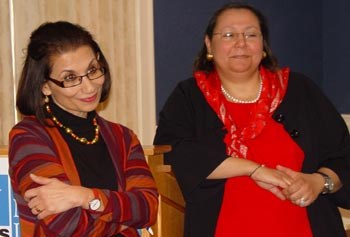Scholars Challenge Myths About Muslim Women

03/13/2013
By Sandra Seitz
We think we know what’s what. A woman wearing a head covering means she’s repressed and religious, while a feminist is a secular person in Western dress, right? But the issue of how Westerners look at Muslim women, making assumptions about their status, is of vital interest to the more than 1 billion Muslim women in the world.
“The phantom of the Muslim woman chases me, so that I am trapped between being perceived as an exotic object of interest and being pitied for my lack of agency,” said Deina Abdelkader, assistant professor of political science, while opening an event, Islam and Feminism: Between Theology and Politics. “I see no contradiction between reason and faith, none between being Muslim and being feminist. Both have fought together for freedom.”
Abdelkader introduced the guest lecturer, Ziba Mir-Hosseini, scholar of Islamic and Middle Eastern law at the School of Oriental and African Studies in London.
Mir-Hosseini traced the different threads of Muslim legal tradition, drawing clear distinctions between the “revealed sacred law” of Shari’ah and areas of jurisprudence and the codified laws. She also explained for Western listeners how women at the forefront of Iran’s revolutionary period in the 1970s wore the head scarf, hijab, as a mark of separation from Western colonialism.
“This was incomprehensible to many feminists, who identified hijab as a symbol of repression,” said Mir-Hosseini. “An angry debate was polarized around hijab. Lost in the debate was that Islamic women, removed from colonialism, could reconcile their identity and status, and feminism could grow within a nationalist movement.”
History is not a fixed entity — after successful nationalist revolutions, Muslim women must advocate for their rights. Mir-Hosseini is a founding member of Musawah – meaning “equality” – an international Islamic group that works to reduce the patriarchal interpretations of law that lead to harsh conditions for women.
“We ask, ‘how did Islamic tradition become so patriarchal?’ and ‘how did feminism become allied to secularism?’ ” said Mir-Hosseini. “The law is very important to me, because it means taking action. Equality has to do with empowerment for all.”
Lesley Xu, a senior English major, said, “I hadn’t realized how problematic our literature about Islam can be. It’s aligned with our Western vision of the world and we have a warped view.” The organization Musawah, she thought, “is ground-breaking work, very inspiring.”
Mir-Hosseini is a legal anthropologist and founding member of the Musawah Global Movement for Equality and Justice in the Muslim Family. Abdelkader, author of Islamic Activists, is an executive committee member of Religion and Politics in the American Political Science Association. Both women are members of the Islamic Jurisprudential Council of North America.
